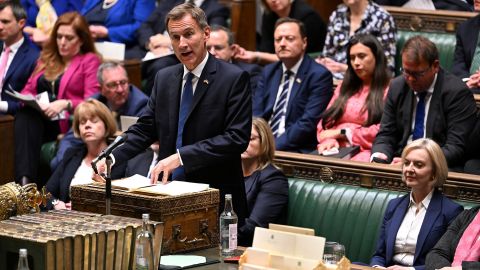Editor’s Note: Rosa Prince is editor of The House magazine. She is former assistant political editor of the Daily Telegraph and author of the books “Theresa May: The Enigmatic Prime Minister” “and “Comrade Corbyn: A Very Unlikely Coup.” The views expressed in this commentary are her own. View more opinion on CNN.
London
CNN
—
“The Prime Minister is not under a desk.”
It says much about the current state of Liz Truss’s troubled premiership that this statement by fellow Conservative minister Penny Mordaunt on Monday afternoon was made, ostensibly at least, as a show of support.

A little over a month after being crowned leader, just about the best that can be said for the embattled Truss is that she is not cowering beneath the furniture inside 10 Downing Street.
She is, however, very much stranded in a wilderness of her own making; “in office but not in power” as was once said of her 1990s’ predecessor John Major; stripped of her authority, policy agenda, grip on her government and party, and, short of a miracle, prospects of leading her party into the next general election.
On Wednesday Truss faced a grilling in her first Prime Minister’s Questions session since u-turning on her flagship economic plan. Her third PMQ’s, as it’s known, proved an ugly affair, with opposition MPs repeatedly calling on her to resign and – worse – cries of derision echoing around the Commons chamber.
Hard to believe it is less than six weeks since Truss descended a helicopter to “kiss hands” with Queen Elizabeth II (two days before the latter’s death in Balmoral Castle, Scotland), becoming the United Kingdom’s 56th prime minister.
As she surveys the shattered wreck of her premiership, Truss must be wondering where it all went wrong – and quite how it collapsed around her ears so quickly.
To recap: as the country observed 10 days official mourning for the late Queen, Truss and her close ally and Chancellor Kwasi Kwarteng drew up plans for a financial package dubbed the “mini-Budget” but with consequences which would feel decidedly maxi.
Truss and Kwarteng’s prescription for turbo-powering the economy in a quest for growth through unfunded tax cuts unnerved the markets, triggering a run on the pound and forcing the Bank of England to step in to prevent pension funds collapsing.
Last week, Truss hoicked Kwarteng back from Washington DC, where he was attending a gathering of the IMF, to fire him for, as critics quipped, following her policies to the letter. In his stead, she installed as Chancellor the experienced Jeremy Hunt, a candidate from the opposite moderate wing of the party, but who trailed in eighth place behind her in the contest to replace Boris Johnson last summer.

On Monday, Hunt took steps to steady the markets by jettisoning the entire mini-Budget, including a planned 1p cut in income tax, a corporation tax rise and VAT-free shopping for tourists (Truss and Kwarteng had already been forced to ditch plans to scrap the top 45p tax rate).
That left Truss’s low-tax economic vision in tatters, a boil lanced not only for the short term but, to the fury of those who had been in her camp, leaving sufficient scar tissue to warn politicians off repeating the experiment for a generation.
Hunt’s statements did the trick in terms of settling the markets, but had the opposite effect on Truss’s authority. When she was late to Parliament on Monday to answer a question from opposition leader Keir Starmer, rumors swept Westminster that she was on her way to Buckingham Palace to proffer her resignation to the King.
Her absence meant Mordaunt – who by the way had come third in the leadership contest – was tasked with answering in her place.
Mordaunt was gifted the opportunity to “helpfully” answer a Labour MP’s question about Truss’s whereabouts by repeating the query – about whether the prime minister was “cowering under her desk” – serving up a dynamite clip for broadcasters and further undermining the prime minister’s authority.
So what now? There are two questions on the lips of every Conservative MP: how long has she got; and how do we get her out?
The answer to the first question lies in the second. The latest rumor suggests that Sir Graham Brady, chairman of the powerful 1922 Committee of backbench MPs, has already agreed with Truss that she will be gone by the end of the week.
Another rumor whispers that she is refusing to budge, gambling that this divided parliamentary party, which threw up no natural successor to Johnson, will be unable to agree on a candidate to replace her.
Having been in government for 12 years, the most electorally successful party in British political history is indeed battle scarred, riven into multitudes of factions and overhung with an air of bitterness.
With voters unlikely to accept another nine-week leadership contest during a time of economic crisis, the received wisdom is that any transfer of power would have to be a coronation rather than a competition.
Polls showing the Conservatives trailing their Labour rivals by a record 36 points, and with Truss appearing increasingly uncomfortable and isolated, mean MPs minds may well have become focused in the last few days.
If the choice is between backing a colleague they disdain and electoral oblivion with Truss, many may well find it expedient to hold their nose and do the former – particularly if their own seat is in peril.
Some now give Truss a few days, some a week or two; few expect her to survive long enough to overtake George Canning to avoid becoming the shortest serving prime minister in British history (in 1827, after barely five months in office, he died suddenly from pneumonia).
For Truss, that would mean surviving another 80-odd days, which in the current, febrile atmosphere feels unlikely if not quite impossible.
The man who came second to Truss, former chancellor Rishi Sunak, has been very quiet in recent days; suspiciously quiet. Those close to him are briefing that, after a bruising defeat to Truss, he has no appetite to wield the knife himself, but suggest he could be persuaded to step up if the call was nearly unanimous.
Boris Johnson had a favorite expression to hint when he was on maneuvers – an old chestnut he returned to even in his departure speech.
“If, like Cincinnatus, I were to be called from my plow, then obviously it would be wrong of me not to help out,” he said in 2009, a decade before winding up in Number 10.
The reference was to Lucius Quinctius Cincinnatus, who Livy relates gave up being consul to return to his farm in the hills above Rome, only to return to lead again when the city was besieged.
Truss will not be the only one wondering this week how long Sunak will remain at his plow.


